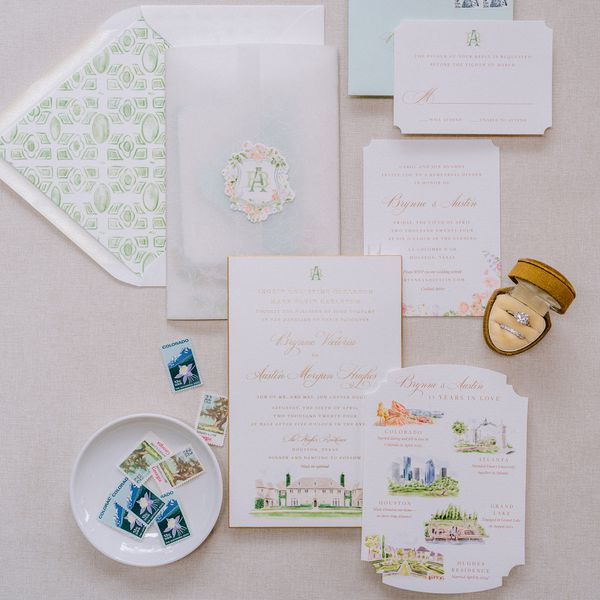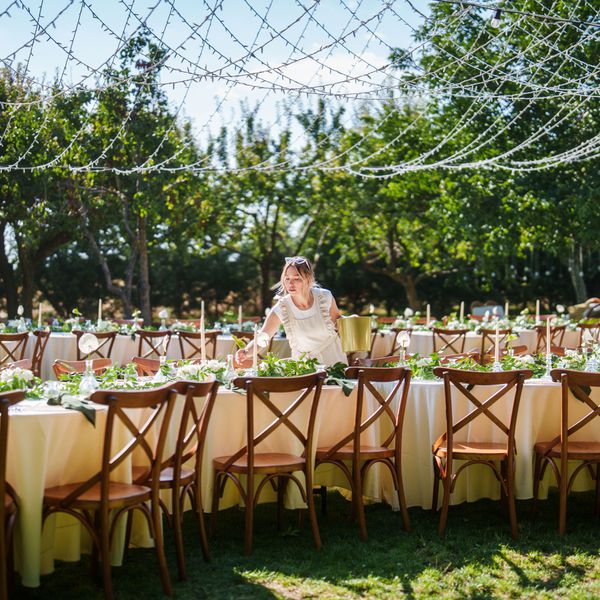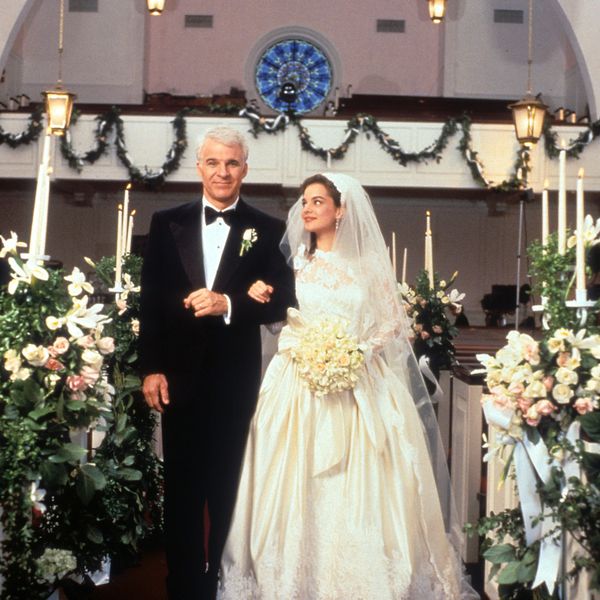:max_bytes(150000):strip_icc()/wedding-planning-9-to-5-checklist-recirc-getty-images-cc11dbbcc0a94a118b7201c31a32c257.jpg)
Prostock-Studio / Getty Images
From touring venues and hiring vendors to attending dress fittings and selecting your menu, planning a wedding isn’t an easy task, as conceptualizing and executing your dream day requires a lot of thought, time, energy, patience, and diligence. The overall process typically takes nine to 12 months, per planner Tory Smith of Smith + James, and every step of the way, there are people who need to be contacted, decisions that need to be made, and details that need to be attended to.
Simply put, planning a wedding is basically a full-time job, which is pretty difficult to manage if you already work a corporate job. When you throw commuting, household chores, errands, and personal time on top of your daily professional obligations, you probably feel like there isn’t any time left in the day for wedding-related tasks. Not to mention, Smith notes that many wedding vendors are open for business during the 9-to-5 window, meaning that working outside of hours is especially challenging.
Meet the Expert
- Tory Smith is the owner and creative director of Smith + James, a high-end destination event planning and design boutique.
- Paula Ewers is the principal owner and lead planner of Truly Ewers Events, which has offices in Dallas, Texas and Atlanta, Georgia.
So, if you’re feeling bogged down by your wedding to-do list and you’re unsure how to balance your professional and personal life, we asked the experts for their advice on how to navigate wedding planning and your career seamlessly. Ahead, here are 10 tips for planning a wedding when you work a 9-to-5 job.
Hire a Professional
If you’re already occupied during the hours of 9 a.m. to 5 p.m., planning a wedding by yourself is almost an impossible task. That’s why Smith recommends hiring a professional wedding planner. “Planners do the work for you,” Smith says. “They help alleviate stress, make vendor selections, manage your budget, and navigate you through the whole process.” By taking on the bulk of the labor, these vendors will free up time in your schedule and space in your mind. Their job is to handle nitty-gritty details, keep everything on schedule, and make the experience as smooth as possible, so you don’t have to worry about tackling your wedding to-do list at the end of a long work day.
Designate Time for Planning
Even if you do hire a planner, there are certain decisions that you must be a part of, whether it’s determining your aesthetic, giving the final say on your tablescape, or meeting with your caterer. That means it’s important to carve out time during your week to attend to these details. If you have a 9-to-5 job, planner Paula Ewers of Truly Ewers Events suggests using your weekends wisely. “Take two to three hours over the weekend to focus on planning,” she recommends. “Even if you feel that you don’t have items to work on, prep for items to come.” Crossing tasks off of your list every week will help you feel prepared and set you up for success in the long run.
Stay Organized
When juggling a full-time job and planning a wedding, staying organized is crucial. Determine a system, such as Google Drive or a paper notebook, where you can compile all of your wedding-related items in one place. “Making lists and staying on top of your tasks will help you manage the extra workload,” Smith explains.
Create an Email for Wedding-Specific Tasks
When communicating with vendors, it’s easy to miss an important detail if you’re using your personal or professional email to keep in touch, and messages about your wedding can easily get lost in the shuffle of furniture sales or meeting reminders. Creating a separate email address that you use specifically for your wedding will help you feel organized and on top of your projects. Not to mention, you’ll separate your corporate life from your wedding planning endeavor, which will make orchestrating your big day more manageable with a full-time job.
To save even more time, Ewers suggests creating folders for each detail, such as “Flowers” and “Wedding Cake.” “This will assist you in searching for information easily when you need smaller details to add to a larger project,” she notes.
Identify Your Priorities
Since time is a limited resource, Ewers advises concentrating on only the aspects that truly matter to you and your partner. “Focus your time and resources on these priorities and consider compromising less important details,” she says. For instance, if the two of you have been dreaming about a floral-filled affair but don’t care much about what your wedding party wears, spend more of your time selecting your blooms and have your crew choose their own outfits from a designated color palette that matches the rest of your aesthetic. Determining what you value most will save you a lot of time and create a more accurate depiction of your love story.
Limit Your Research
Planning your big day already takes up space in your schedule, but if you constantly check outside sources every time you need to make a decision, you’ll never have any free time after your corporate job. To make the process as efficient as possible, Smith encourages you to limit scrolling on social media. “Don’t get caught in the trap of spending so much time on Pinterest or Instagram that you get decision fatigue and become overwhelmed with options,” Smith states. “Be confident in your vision and stick to it.”
Scale Back on DIY Projects
Adding a few DIY projects to your agenda is definitely a fun and budget-friendly way to express your creativity, but tackling these tasks can be a huge time sucker—especially for those with 9-to-5 jobs. If you really want to get crafty ahead of your wedding, take on one or two DIY designs and buy or rent the rest of your decorations. Just be sure to start the initiative far in advance, so you aren’t bogged down at the last second.
Learn to Delegate
Although you probably feel responsible for bringing your vision to life, handling every single detail on your own isn’t feasible when you have a full-time job competing for your resources. Trust that your wedding day will still run smoothly if you relinquish some of the control and have others chip in. To effectively do this, call upon your friends and family members to complete tasks based on their skill sets, according to Ewers. Maybe you ask your partner to curate a playlist and create the menu, while you enlist your mom to pick up your wedding dress. Any assistance will go a long way.
Find an Accountability Partner
It can be tempting to skip wedding planning tasks after a tiring workday, especially if you’re the one holding yourself accountable. If you aren’t typically a self-motivated person, find a partner who will “help you stay on track with your planning goals and commitments by providing support, motivation, and encouragement,” Ewers suggests. Perhaps you ask your maid of honor to check in with you once a week—either on a phone call or via text message—and ask what projects you worked on. Having someone on top of your deadlines might help you feel more inclined to buckle down.
Reframe Your Thinking
While planning a wedding can be arduous at times, if you constantly tell yourself that you don’t have enough time to work your 9-to-5 job and plan your nuptials, you’ll bring unnecessary anxiety into the picture. How you view the process will affect your experience of it, so sometimes, all it takes is a shift in your perspective and self-talk. “Remember, you are planning a party to celebrate the fact that you fell in love with your forever person,” Smith points out. “It’s a celebration! I’ve seen people fall victim to wedding stress when they forget to keep the main thing in focus. It shouldn’t feel burdensome or like an extra job–it should be fun! Always keep that in mind, so you don’t let drama or stress get you down or distract you from your actual full-time job.”












